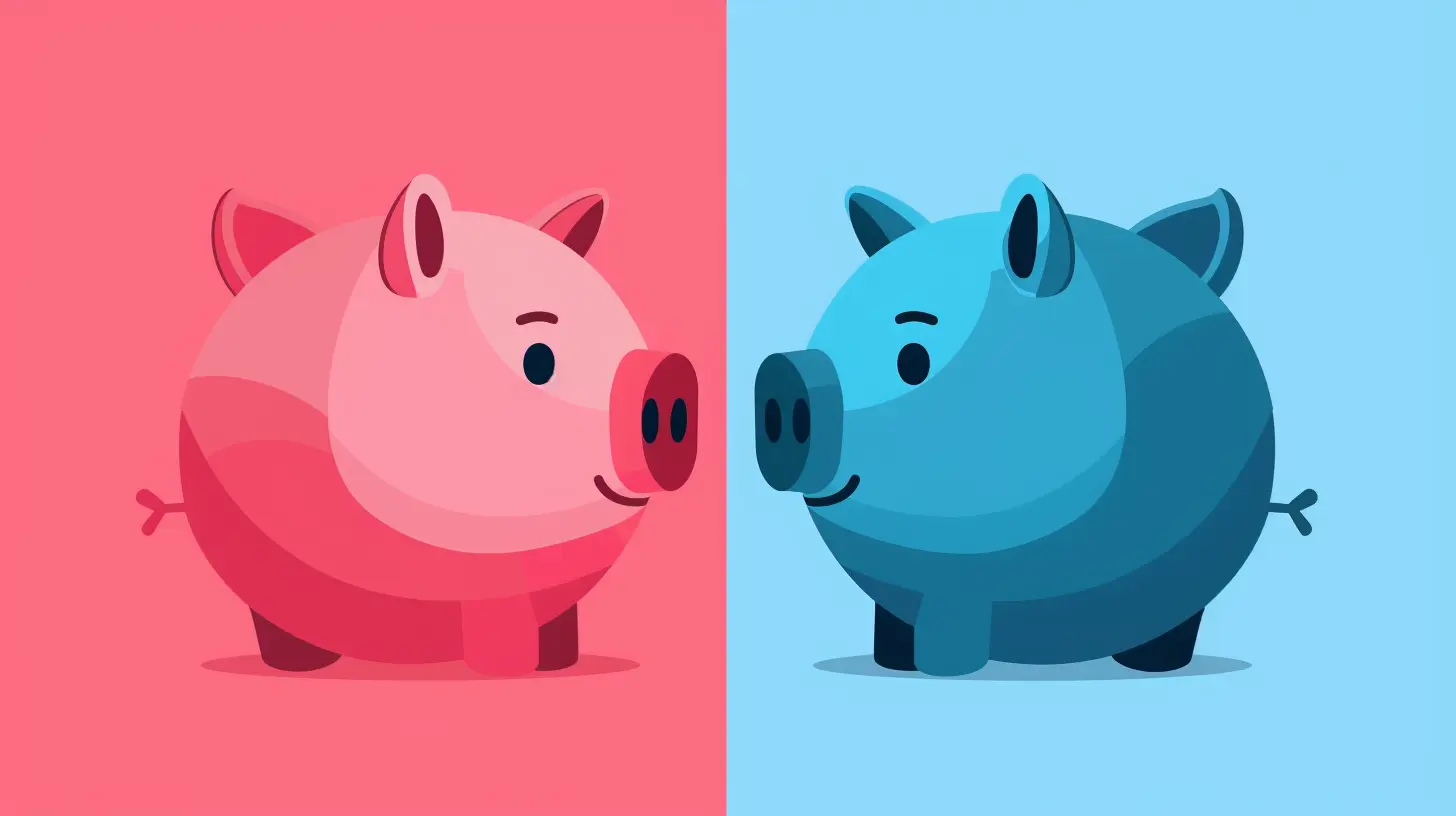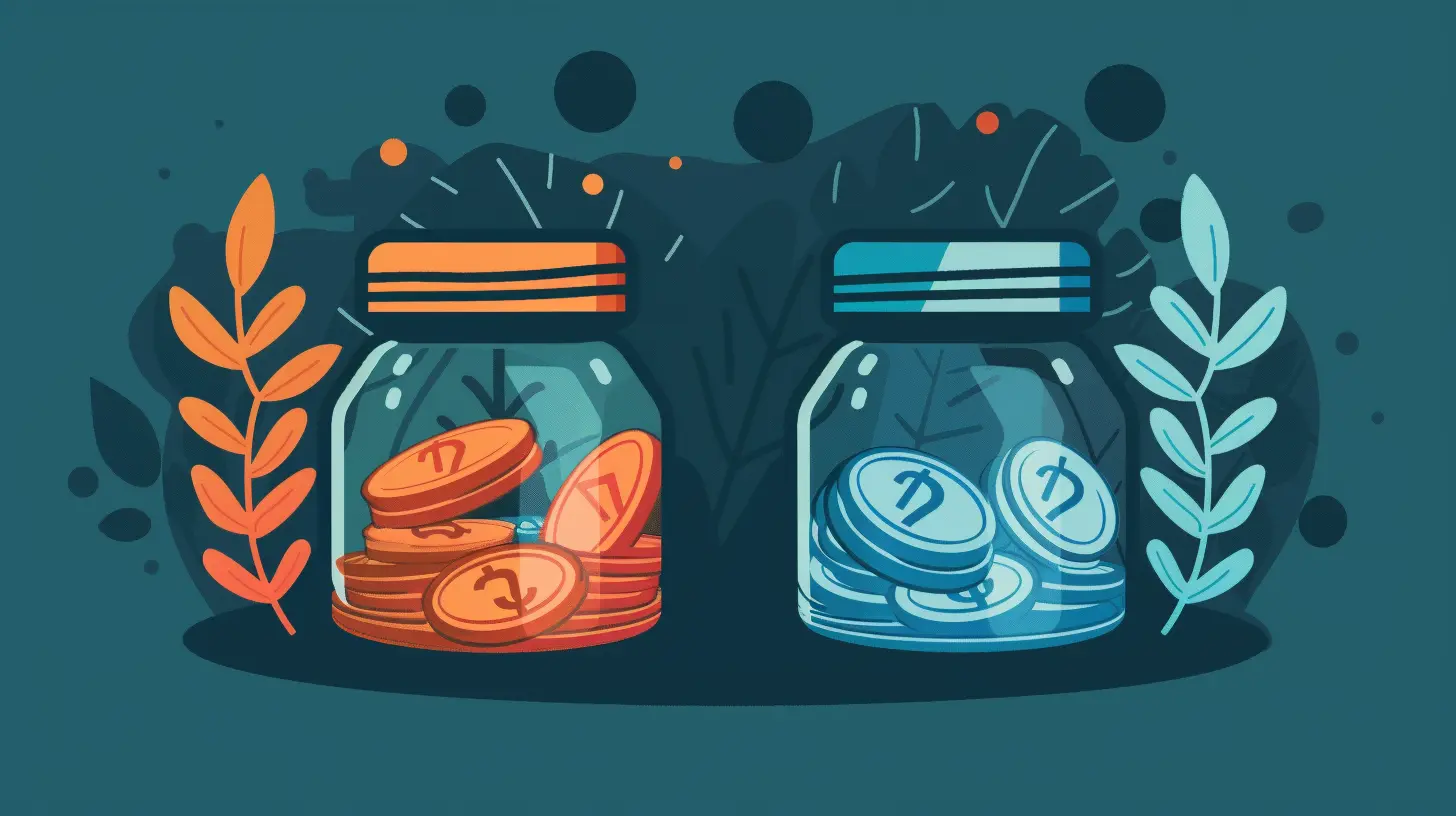Comparing Traditional vs. Online Savings Accounts: Which Is Best?
5 February 2025
When it comes to saving money, choosing where to stash your cash is just as important as how much of it you're saving. You’ve worked hard for it, so why not ensure it’s working just as hard for you? That’s where the age-old debate of traditional vs. online savings accounts comes into play. Both have perks, quirks, and a few potential drawbacks. So, how do you decide which is best for you? Don’t worry—you’re in the right place. We’re breaking it all down for you in plain English. Ready to dive in?
What’s a Traditional Savings Account?
Let’s start with the classic choice: the traditional savings account. These accounts are usually offered by brick-and-mortar banks—the ones with big logos you see on street corners. They’ve been around forever, giving your grandparents (and even great-grandparents) a safe spot to park their cash.Why People Love Traditional Savings Accounts
1. Face-to-Face ServiceEver had a problem and wanted an actual human to help sort it out? With a traditional bank, you can walk right into a branch and chat with a real person. No chatbots or endless hold music—just good old-fashioned service.
2. Physical Presence
There’s something comforting about seeing your bank’s name on a building. It gives you a sense of security, right? Plus, you can deposit or withdraw cash instantly at your bank’s ATMs or teller counters.
3. Bundled Services
Many traditional banks offer a suite of services under one roof. From checking accounts to home loans, they’re a one-stop-shop for all things finance. This can be super convenient if you like keeping everything in one place.
The Downsides of Traditional Savings Accounts
However, it’s not all sunshine and rainbows. Traditional savings accounts often come with their fair share of annoyances.- Low Interest Rates: Let’s be real—traditional banks aren’t exactly known for their generosity when it comes to interest rates. Your money might feel cozy in a traditional account, but it’s also probably growing slower than a snail on a treadmill.
- Fees, Fees, and More Fees: Monthly maintenance fees, minimum balance requirements, and overdraft fees can drain your account faster than you’d like.
- Limited Accessibility: Sure, their apps are improving, but some traditional banks still feel a bit stuck in the Stone Age when it comes to technology.
What’s an Online Savings Account?
Now, let’s talk about their tech-savvy cousin: the online savings account. These accounts operate primarily (or entirely) in the digital world. No physical branches, no fuss—just your money and a good Wi-Fi connection.Why People Love Online Savings Accounts
1. Higher Interest RatesImagine your savings account as a garden. If traditional banks plant one seed, online banks throw down a handful. Why? Since they don’t have to pay for physical branches, they pass those savings on to you in the form of higher interest rates.
2. Low (or No) Fees
Hate fees? (Of course, you do!) Most online savings accounts are fee-free. You won’t have to jump through hoops to avoid hidden costs.
3. 24/7 Accessibility
With an online account, your bank is always open. Need to check your balance at 2 a.m. in your pajamas? No problem. Want to move money while you’re on vacation? Easy-peasy.
4. User-Friendly Apps and Tools
Online banks are built with tech-savvy users in mind. Their apps and websites are typically sleek, intuitive, and packed with budgeting tools, account insights, and customer support features.
The Downsides of Online Savings Accounts
Of course, no financial product is perfect. Here are a few things to watch out for:- No Physical Branches: If you’re someone who values face-to-face service, you might struggle with the lack of human interaction.
- Cash Deposits Can Be Tricky: Without a physical branch, depositing cash can be a bit of a hassle. You might need to use an ATM or transfer funds from another account.
- Learning Curve: If you’re not super comfortable with technology, navigating online banking might feel intimidating at first. 
Key Differences Between Traditional and Online Savings Accounts
To make things a little easier, let’s break down the major differences between these two types of accounts in a handy table:| Feature | Traditional Savings Account | Online Savings Account |
|-------------------------------|----------------------------------|------------------------------------|
| Interest Rates | Typically Low | Often High |
| Fees | Moderate to High | Low to None |
| Customer Service | In-Person and Online | Online and Phone |
| Physical Branches | Yes | No |
| Mobile/Online Tools | Improving, but Limited | Advanced, User-Friendly |
| Cash Deposit Options | Easy | Can Be Challenging |
So, Which Should You Choose?
Alright, decision time. Ultimately, the best savings account for you depends on your priorities and lifestyle. Let’s break it down further:1. You Might Prefer a Traditional Savings Account If…
- You value in-person customer service and enjoy chatting with a banker face-to-face.
- You frequently deal with cash deposits.
- You’re already using other services from a specific bank and want everything in one place.
2. You Might Prefer an Online Savings Account If…
- You want your money to grow faster with higher interest rates.
- You’re tech-savvy and value easy online tools over physical branches.
- You want to avoid monthly maintenance fees and account minimums.
Can You Have Both?
Here’s the good news: you don’t have to pick just one! Many savvy savers use a combination of traditional and online accounts. For instance, you could keep a traditional savings account for everyday needs and an online savings account for long-term goals. This way, you get the best of both worlds. Think of it like having your cake and eating it too—but without the guilt.Final Thoughts
At the end of the day, the right savings account is the one that meets your needs and helps you reach your financial goals. There’s no one-size-fits-all answer here, and that’s okay! The most important thing is to ask yourself what you value most—whether it’s convenience, high interest rates, or customer service—and go from there.Whatever you choose, remember this: the fact that you’re setting money aside in the first place means you’re already ahead of the game. So, pat yourself on the back—you’re crushing it!
all images in this post were generated using AI tools
Category:
Savings AccountsAuthor:

Julia Phillips
Discussion
rate this article
15 comments
Lisa Bishop
Consider interest rates, accessibility, and fees carefully.
February 25, 2025 at 7:38 PM

Julia Phillips
Absolutely, those factors are crucial in making an informed decision. Each option has its pros and cons, so it's essential to evaluate them based on your personal financial needs.
Emory Lawson
Online savings accounts offer higher interest rates and convenience, while traditional accounts provide personal service and stability.
February 22, 2025 at 3:54 AM

Julia Phillips
Both online savings accounts and traditional accounts have their advantages; the best choice depends on your priorities—higher interest rates and convenience versus personal service and stability.
Sloane Dodson
This article effectively highlights the key differences between traditional and online savings accounts. It emphasizes interest rates, accessibility, and fees, aiding readers in making informed decisions based on their financial goals and preferences. Well done!
February 19, 2025 at 5:54 AM

Julia Phillips
Thank you for your insightful comment! I'm glad you found the article helpful in navigating the differences between traditional and online savings accounts. Your feedback is appreciated!
Georgina McNeal
Great insights! It's essential to weigh the pros and cons of both options based on personal financial needs.
February 17, 2025 at 1:24 PM

Julia Phillips
Thank you! Balancing the pros and cons is crucial for making the best choice for your financial goals.
Gideon Kearns
This article provides a clear and insightful comparison between traditional and online savings accounts. I appreciate the practical tips and balanced perspective on interest rates and accessibility. It’s a valuable resource for anyone looking to make informed financial decisions.
February 13, 2025 at 7:30 PM

Julia Phillips
Thank you for your feedback! I'm glad you found the comparison helpful and informative.
Felicity McKay
When choosing between traditional and online savings accounts, consider interest rates, fees, accessibility, and customer service. Each option has unique benefits that cater to different financial needs.
February 13, 2025 at 12:56 PM

Julia Phillips
Thank you for your insights! You've highlighted key factors that can greatly influence one's decision between traditional and online savings accounts.
Abigail Reed
This article thoughtfully highlights the pros and cons of both traditional and online savings accounts. Understanding your personal financial goals and preferences is crucial in making the right choice. It's all about finding what aligns best with your needs and comfort!
February 11, 2025 at 12:42 PM

Julia Phillips
Thank you for your thoughtful comment! I'm glad you found the article helpful in navigating the choice between traditional and online savings accounts. Understanding your unique financial goals is indeed key to making the best decision.
Arlo Love
This article provides a concise comparison of traditional and online savings accounts. It effectively highlights key differences, such as interest rates and accessibility, helping readers make informed decisions. Overall, a valuable resource for anyone looking to optimize their savings strategy.
February 10, 2025 at 5:38 AM

Julia Phillips
Thank you for your feedback! I'm glad you found the comparison helpful for making informed savings decisions.
Valeris McKay
Great article! It’s so helpful to weigh the pros and cons of traditional and online savings accounts. I love how easy online banking is, but I also appreciate the personal touch of traditional banks. It’s all about finding what works for you!
February 9, 2025 at 12:38 PM

Julia Phillips
Thank you for your thoughtful comment! I’m glad you found the article helpful in weighing your options. Finding the right balance between convenience and personal service is key!
Craig Butler
While traditional savings accounts offer in-person service and local accessibility, online savings accounts typically provide higher interest rates and lower fees. Ultimately, the best choice depends on individual preferences for convenience versus personal interaction.
February 8, 2025 at 7:51 PM

Julia Phillips
Thank you for your insightful comment! Indeed, the choice between traditional and online savings accounts hinges on balancing the benefits of personal service with the advantages of better rates and lower fees. Each individual’s needs will ultimately guide their decision.
Oberon Larsen
Online accounts offer higher rates, traditional convenience.
February 8, 2025 at 11:36 AM

Julia Phillips
Indeed, online accounts often provide better rates, while traditional banks excel in in-person accessibility and services. The best choice depends on your priorities!
Callista Nguyen
Whichever you choose, remember: saving is like a marathon, not a sprint! Keep going, and your future self will thank you!
February 7, 2025 at 8:59 PM

Julia Phillips
Absolutely! Consistent saving, whether through traditional or online accounts, sets the foundation for long-term financial success. Thank you for the reminder!
Lacey McMichael
What a delightful read! Exploring the pros and cons of traditional versus online savings accounts is so enlightening. It’s exciting to see how technology is reshaping our savings strategies, giving us more options than ever. Here’s to making informed choices and boosting our financial futures! 🌟💰
February 7, 2025 at 2:01 PM

Julia Phillips
Thank you for your thoughtful comment! I'm glad you found the comparison insightful and relevant to today's evolving financial landscape. Here’s to empowered financial decisions! 🌟
Oriel McCool
Online savings accounts often offer higher interest rates and convenience compared to traditional ones.
February 6, 2025 at 8:06 PM

Julia Phillips
You're right! Online savings accounts typically provide better interest rates and greater accessibility, making them an attractive option for many savers.
Grey McElhinney
Digital piggy banks: no oinking, just saving!
February 6, 2025 at 1:06 PM

Julia Phillips
Thank you! Digital piggy banks certainly make saving easy and accessible, with added convenience and often better rates compared to traditional options.
MORE POSTS

Exploring the Tax Implications of Interest Earned in Savings Accounts

What the PEG Ratio Tells You about a Stock’s True Value

Understanding the Role of Insurability in Life Insurance

Crowdfunding for Sustainable Ventures: Funding a Greener Future

How to Make Employer 401k Matching a Cornerstone of Your Retirement Strategy

Best Practices for Quantifying and Managing Interest Rate Risk

Understanding Debt Consolidation: Is It the Right Move?

How to Open a Bank Account If You Have Bad Credit

Travel and Meal Expenses: What’s Deductible and What’s Not

Entrepreneurial Finance: Secrets to Scaling With Limited Resources